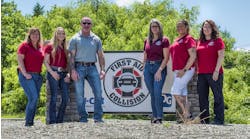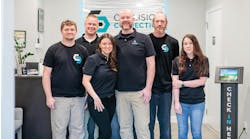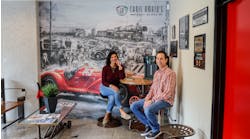Extra services bring in the volume and profits to this Michigan shop — and a lot of extra hours
"Business is good and I like my job," Sharifi says. "The only thing is I don't get to spend time with my family. For eight years, I used to work seven days a week; now I work six. I come to work at 7:30 a.m. and go home at 8:30 p.m.."
Like many body shop owners, diversification initially was a survival strategy for Sharifi, as his company tried a variety of avenues to gain customers. During the early years Sharifi repaired damaged vehicles for car rental companies that provided a steady stream of work — but at relatively low margins. Today Sharifi works with just a single car rental company, which generates about 35 percent of the shop's business.
"It doesn't pay as well as insurance company work, but the cars are easier to fix because they're all '07s, so you can buy new parts and turn them around faster." At any given time, Sharifi has 10-12 rental cars in his shop for repair. "When we fix one, we take it back and get another one." The shop is one of 12 the rental company uses for its repairs, but recently it chose International Collision as its best vendor.
Sharifi started his business, originally known as Aliz Body Shop, in 1989 in Milan, Mich., after attending Eastern Michigan University in nearby Ypsilanti. The original shop was just 500 sq. ft. and Sharifi was the only employee.
The solution to a logistical problem led him into another line of business. "For the first six months I had trouble moving cars because I was by myself, so I bought a tow truck," Sharifi says. "Then I noticed that people pay a lot of money to move cars, so I started towing for others."Within three years, Sharifi outgrew the Milan building and moved to a new 2,000-sq.-ft. location in Ypsilanti. In 1998, the company moved to its current location — a former telephone company building that Sharifi rebuilt into a body shop. Although the building is long and narrow — 80 feet wide and 230 feet long — Sharifi says the layout works well. "It's wide enough to have stalls on the left and right," he says.
By that time, the towing business had expanded significantly. The company owned several tow trucks and was handling towing for a rental car company. But when a key towing customer went bankrupt, Sharifi decided to sell the towing business — although he continues to keep one truck, which is used only to support his own repair business. "It helps a lot, especially for insurance claims," notes Sharifi. "If a car is in an impound yard, we offer to pick it up right away so they don't have to pay storage."
Along with the decision to sell the towing business came the decision to change the name of the company to its current name. Another change coincided with the 1998 name change and the move to the current location: Sharifi took on a partner to help manage the growing business, but ultimately bought his partner out in 2004. The two men are still friends, Sharifi says, but he adds, "My Dad told me if having a partner was good, God would have a partner, too."
During the late '90s and early 2000s, Sharifi's company actually did a higher volume of sales than it does today — but what it really meant was that the diverse business had spread itself too thin. "In 1999, I had 18 people and did a lot of rental cars; we had two shifts," remembers Sharifi. "But I didn't make more money. It's not about how many more cars you're going to do. It's about how you're going to fix them."In keeping with the "smaller is better" theme, the company is on just one DRP, which generates about 25 percent of its business. "If you do more DRP work, it means they own you," says Sharifi.
International Collision's towing capability and its mechanical work help lure customers to the shop. "We started doing alignment and mechanical work; when someone comes in for a mechanical job, they find out we're a body shop," notes Sharifi. A range of customer benefits — such as pickup and delivery service, and a lifetime warranty and free detailing on body repairs — also helps attract customers and keep them coming back. "The easier you make it for customers, the more likely they are to come here," Sharifi says.
Another line of business that has worked out well for Sharifi is buying damaged cars at insurance company and rental car auctions, repairing them and reselling them. Often cars with more than $3,000 or $4,000 worth of damage are totaled, then sold at such auctions, notes Sharifi, who determines which cars to buy by comparing his cost to repair them with their market value. "I buy '05s, '06s and '07s that have the manufacturer's warranty," he says, adding that he nets margins in the range of 25 percent to 30 percent upon resale.
Sharifi wants to open a second shop in nearby Ann Arbor. Even during the downturns that periodically impact Michigan's economy, Sharifi believes there is always enough business. "Even if the economy is bad, people have to have their car; they have to fix it," he says. "As long as you do good work, you don't need to worry about it."




